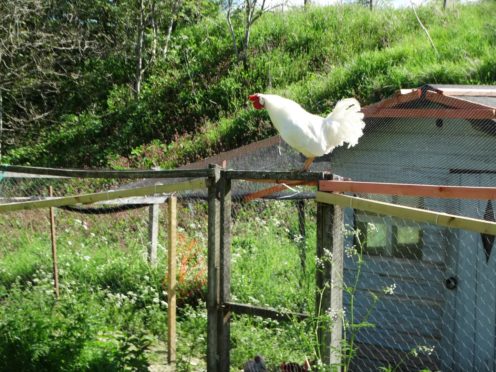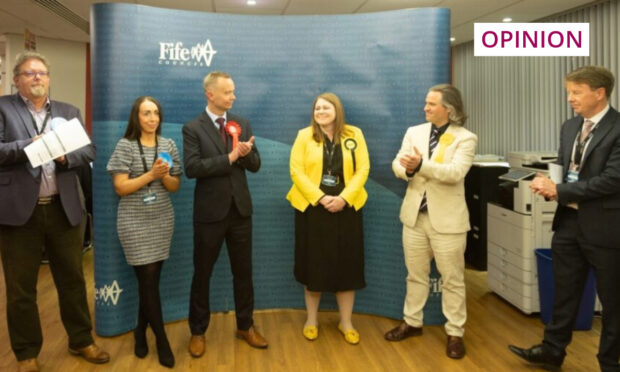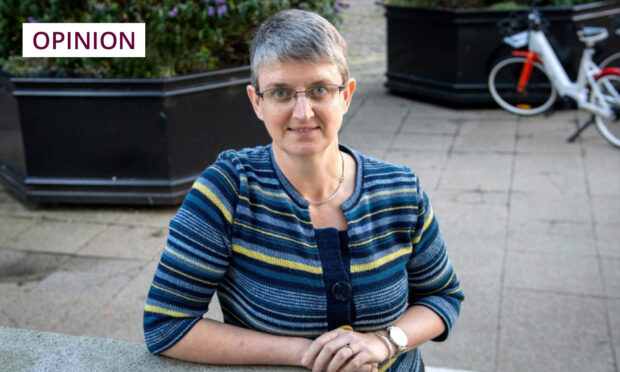Able at last to visit our family the Doyenne and I took advantage of being in Edinburgh to drive on down to Peebles to see son James and his family.
The Borders hold many fond memories from our time at Edinburgh University and our first year of marriage we lived in Dalkeith or, more properly, Eskbank which was the posh end of the town.
There were many decorously wild Friday and Saturday evenings spent in the Justinlees Inn where the great and the good of Edinburgh solicitors and accountants who wanted to live “out of town”, gathered to let their hair down.
As I was a law apprentice in a highly respected firm of Edinburgh solicitors it fair opened my eyes to what my future might have been had we not come home to Montrose and I had joined my father’s firm.
But to return to the family – James fired up the barbecue and we spent the evening in the garden with the evening chorus dinging in our ears, catching up with all their news.

I was awoken around 4am, not by the dawn chorus but by Hobbit the pure white Leghorn cockerel who decided to tune up too. He’s clearly proud of his ringing tones, throwing himself heart and soul into it every time he crows, and he banged on for fully half an hour by which time I was entertaining dark thoughts about a casserole pot.
I hesitated to ask why a white Leghorn cockerel should be called Hobbit for fear my granddaughter’s despairing cries of “Oh, Grandpa!” at her grandparent’s naivete should haunt the dark hours of the night as I lay “awoke”.
I don’t know what woke means either, so I’m likely a great challenge to my grandchildren.
Birthday on board
Our trip to Edinburgh was to join the celebrations for a longstanding friend’s landmark birthday held on board Fingal, the former Northern Lighthouse Board’s service vessel now permanently berthed in Leith harbour and converted to a luxury floating hotel.
Fingal holds special memories for our hostess as her father had been a Commissioner of Northern Lighthouses and her mother had launched the ship in 1963.
Fingal was the legendary warrior king of an epic poem by James Macpherson who claimed to have discovered the poems of Ossian, the fictitious bard of the Gaels and son of Fingal.
Both the Scots and the Irish have claimed Fingal for their own but the whole story gets pretty murky the deeper you dig for the truth. The only certain truth is that the dramatic sea cave on the Island of Staffa in the Inner Hebrides and known as Fingal’s Cave, is forever associated with the warrior king.
Nothing in the story suggests that Fingal ever so much as visited his eponymous cave, or hid there from his enemies or even sat at its entrance enjoying the sun.
But it inspired painter JMW Turner’s compelling seascape and, perhaps more famously, the sound of the Atlantic swell and of the waves breaking on the rocky shore inspired composer Felix Mendelssohn’s Hebridean Overture, more popularly known as Fingal’s Cave Overture.
Along with Sir Walter Scott, Queen Victoria and Robert Louis Stevenson I too have seen the cave, when sailing with friends.
Beginner’s luck
After spending the night anchored at Iona, where we visited the Abbey, Staffa is about half an hour’s sail. It’s a small island – just half a mile long – but its dramatic rock formations give it great grandeur.
I’ve met sailors who have spent a lifetime hoping for calm enough conditions to be able to land and explore the island and I was lucky enough the first, and to date, only time I was there.
We climbed down into the cave and I sang a stave or two which echoed round its cathedral dimensions. I felt it forged a spiritual bond between me and Mendelssohn and I’ve loved his music ever since.
Our drive home on Sunday was in glorious sunshine with the Ochil Hills and foothills of the Grampians shimmering in a misty haze away to our left. Hawthorn bushes planted among the roadside beech hedges had burst into flower overnight and were awash with frothy cascades of ivory-white Chantilly lace.
We have a swallow’s nest in the eaves of the house. They are feeding chicks and we watch them swooping into the nest with beakfuls of insects – all caught on the wing – stopping just long enough to stuff them down the nearest gaping throat and dashing out again for another helping.
We hope they won’t suffer the fate of the last pair we had whose nest dried out and fell to the ground with a single, newly hatched chick which inevitably died. We can expect them to raise at least another brood, maybe even two. It all depends, as does almost everything in nature, on the availability of food.










